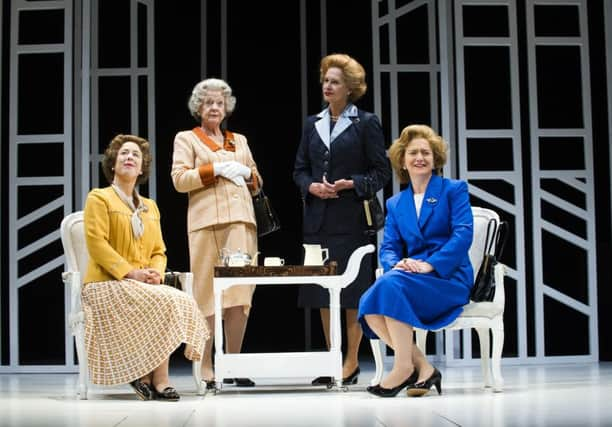Theatre review: Handbagged, Edinburgh


Susie Blake’s Queen Elizabeth is the steel-haired elderly lady with the waspish sense of humour who still goes about her royal duties today; Kate Fahy bears an uncanny resemblance to the smartly-suited Lady Thatcher of the declining years.
And then, they enter all over again, as their younger fiftysomething selves, in the shape of a lively Emma Handy as “Liz,” and a domineering Sanchia McCormack as “Mags”; and begin to lead us through the story of the most dramatic and defining years in British politics since the Second World War.
Advertisement
Hide AdMoira Buffini’s Handbagged began life at the Tricycle Theatre in Kilburn, and its roots in smaller-scale radical theatre are sometimes visible here. Richard Kent’s simple set of receding white door-frames conjures up, without fuss, the grand palace setting where Queen and Prime Minister enjoyed – or failed to enjoy – their routine weekly private conversations. More to the point, Buffini’s script filters the story of Margaret Thatcher’s years in Downing Street through the lens of what she imagines – with some evidence – as a slightly fraught relationship between the ideologically driven PM and the monarch, who is framed here as an old-style British social democrat and champion of the post-war settlement, privately appalled by the divisiveness of Mrs Thatcher’s policies.
It’s a measure of the quality of Buffini’s writing, though, and of the sheer significance of the events it describes, that it scales up effortlessly to the main stage of the King’s. There’s plenty of amusing by-play with the two actors hired by the grand ladies to play all of their attendant lords, footmen and husbands, not least when they drop the mask to play themselves, badly-paid actors with plenty of reservations about the Thatcher legacy; and Indhu Rubasingham’s production combines a light touch with a formidable grasp of the issues at stake.
Plays featuring the Queen often portray her as the wise, all-seeing figure we meet here; and sometimes the effect is merely cosy and reassuring. Here, though, Moira Buffini uses the device to brilliant effect, to expose how the Thatcher years fractured the postwar Britain into which she was born. And although her play sparkles with brilliant one-liners, and offers a hugely enjoyable night out, its subject is an immensely serious one, handled with both sharpness and subtlety; perhaps, for those of us who live in Britain, the most serious of our time.
• Final performances today